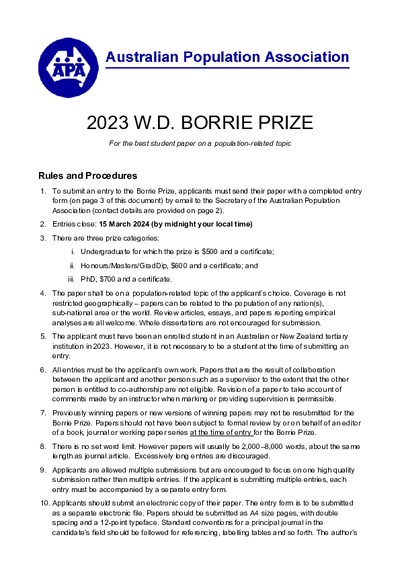The W.D. Borrie Prize is awarded to the best student paper on a population-related topic. Students of demography and population studies, enrolled in an Australian or New Zealand tertiary institution are eligible to enter across three prize categories:
a) Undergraduate
b) Honours / Masters / Graduate Diploma
c) PhD
Certificates, cash prizes, and a publication opportunity in Australian Population Studies are awarded to the winners in each category. Papers can be on any population-related topic of the student's choice. There is no set word limit. However, papers will usually be 2,000-8,000 words, about the same length as a journal article. Excessively long entries are discouraged.
For more information, download the Borrie Prize Rules and Entry Form:
To enter, send your paper with a completed entry form to the APA Secretary: secretary@apa.org.au
Winners and runners-up of the 2022 W.D. Borrie Prize
Undergraduate winner:
Edward Anthony (University of Melbourne): Birthing a new nation: How the success of Rwanda's recent fertility transition has contributed to its recovery post conflict.
Undergraduate runners-up:
Ruth Slonimsky (University of Melbourne): Drivers and characteristics of Palestinian labour migration from the West Bank to Jerusalem.
Ru Hui Foong (University of Melbourne): Family ruptures: Implications of the migration of mothers on left-behind children in the Philippines.
PhD winner:
Cho Yat Wong (University of Queensland): Regional settlement and integration outcomes of humanitarian migrants in Australia.
The judges were impressed with the depth and breadth of the essays submitted and hope that APA members will continue to encourage their students to submit a paper for the Prize.
Congratulations to our winners and all entrants to the 2022 prize! A very special thank you also to our judges. The prize would not be possible without their incredible generosity of time and expertise.
History of the W.D. Borrie Prize
The Australian Population Association Prize was instituted in 1984 for the ‘best undergraduate essay on a population-related topic’. The purpose of the Prize was to ‘encourage interest in population-related studies among undergraduates at Australian tertiary institutions and to inform them of the Association and its aims’. The first Prize was awarded in 1985 to Horst Posselt—later Director of Family and Community Statistics at the Australian Bureau of Statistics—for his paper on ‘Mortality and marital status’. In 1986 the winning paper was ‘Who were the female convicts?’, by Deborah Oxley, who went on to write Convict Maids: The Forced Migration of Women to Australia (Cambridge University Press, 1997). In 1987 the Prize was renamed for the patron of the Australian Population Association, Emeritus Professor Borrie. The postgraduate category was added in 1988, and entry was extended to New Zealand students in 2009. Since its inception, the Prize has been awarded to around 40 students, many of whom now have successful careers in population-related fields.
W.D. (Mick) Borrie, 1913-2000
Always known as 'Mick', Wilfred David Borrie was Australia's first full-time academic researcher in population studies. He, and the team he built up at the Australian National University (ANU) from 1951 onwards, made Australia's name well known throughout the world for high-quality work on population trends and policies in Australia, the Pacific, Asia, Europe, North America and other parts of the world. Borrie himself wrote in most of these areas, including an important book in 1970 on The Growth and Control of World Population.
Born in New Zealand in 1913 and educated at Otago and Cambridge universities, Borrie came to Sydney in 1941. After teaching social history in Sydney University, he joined the very new ANU in 1948 as staff member in charge of population studies. He remained Professor of Demography until retirement in 1978, his being the first Chair of Demography anywhere in the world. Later, keen to extend population studies throughout Australia, he encouraged the formation of the Australian Population Association in 1980. He remained its patron until he died.
Mick Borrie's remarkable energy, together with his gift for choosing competent colleagues and assistants, led to a great output of publications. Either alone, or as principal author, he produced 15 books and 163 articles or reports. His last book was published in 1993 when he was more than 80.
Adapted from Price, C.A. 2000. ‘Obituary. Wilfred David (Mick) Borrie, CBE, 1913-2000’,Journal of Population Research, 17(1): v-vi.
